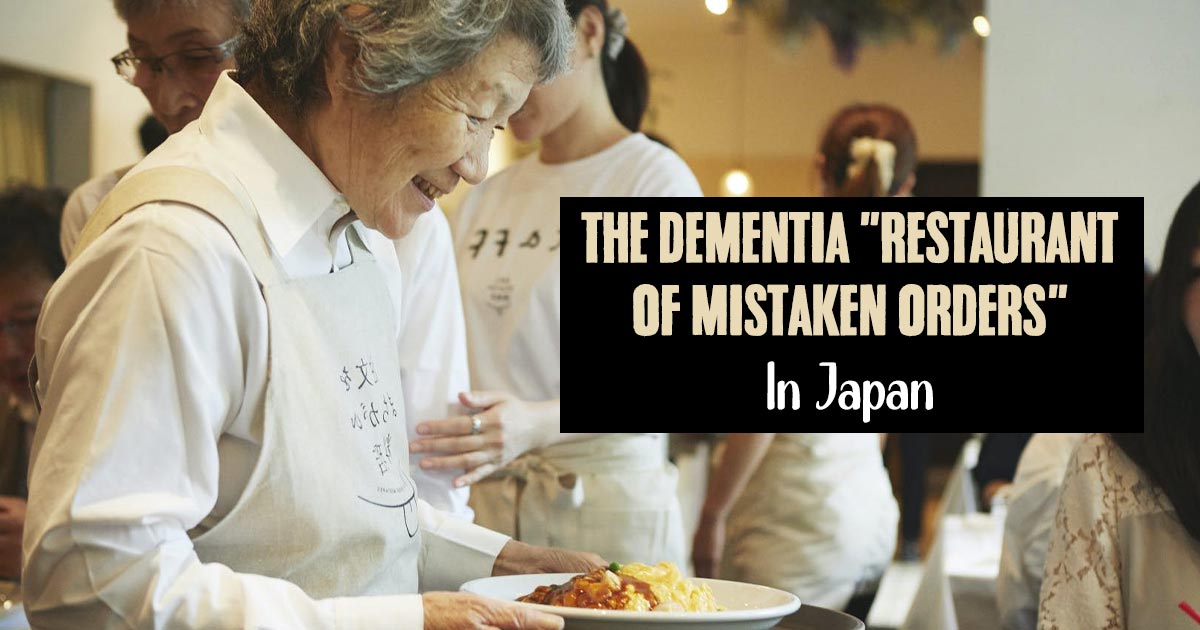In the bustling city of Tokyo, a novel dining experience is redefining the relationship between patrons and servers while embracing the beauty of human imperfection.
Aptly named “The Restaurant of Mistaken Orders,” this innovative eatery is challenging conventional notions of culinary perfection, all the while raising awareness about dementia and nurturing a culture of empathy and understanding.
Founded by Shiro Oguni in 2017, the restaurant offers a refreshing departure from the norm in a country known for its groundbreaking gastronomic concepts. Amidst robot waitstaff and themed dining establishments, “The Restaurant of Mistaken Orders” stands as a unique bastion of authenticity and compassion.
At its heart, this unconventional Dementia restaurant in Japan encourages patrons to cast aside their preconceived expectations. The servers themselves are individuals navigating the complexities of dementia, occasionally mixing up orders. However, what emerges from these charming mishaps is not frustration, but shared laughter and a sense of camaraderie.
Shiro Oguni’s visionary concept is not merely about celebrating quirks, but also about providing an empathetic perspective on living with cognitive challenges. The restaurant, with its distinctive mission, taps into the powers of humor and compassion to transform the narrative around dementia.
It illustrates that those touched by the condition are still capable of contributing meaningfully to society, leading lives imbued with purpose and enrichment.
Within this unique dining environment, a resounding lesson emerges — individuals grappling with dementia are not defined by their challenges, but by their spirit and untapped potential. Through inadvertent mix-ups, authentic laughter, and heartfelt connections, the establishment nurtures an atmosphere of inclusivity and acceptance.
Although approximately 37% of orders may experience delightful mix-ups, patrons overwhelmingly embrace the experience. This positivity can be attributed to the establishment’s candid title, which sets expectations upfront, as well as the undeniable quality of the culinary offerings. Irrespective of what graces their plates, diners savor not only the delectable cuisine but also a side of heartwarming companionship.
Yet, the impact of “The Restaurant of Mistaken Orders” extends far beyond its walls. Through hosting events and pop-ups, including appearances at significant venues like the Ministry of Labour, Health and Welfare, the restaurant transforms into a symbol of connection and understanding.
The establishment keeps its patrons informed about upcoming events through its website and social media platforms, inviting enthusiasts to partake in the celebration of shared human experiences.
In a world where the relentless pursuit of perfection often overshadows the richness of human connections, this restaurant serves as a poignant reminder. It illustrates that imperfections can serve as the very foundation of unity and that genuine moments of shared laughter and understanding can transcend societal barriers.
In the bustling city of Tokyo, the “Restaurant of Mistaken Orders” stands as a beacon of hope and a testament to the power of embracing vulnerability. Through its unconventional approach to dining and its celebration of the beauty inherent in human fallibility, the restaurant presents a transformative narrative.
It nudges society toward a more compassionate perspective on dementia, while encouraging us all to embrace the unique attributes that make us human. As patrons and servers share laughter, mishaps, and genuine connections, they redefine the parameters of what a truly enriching dining experience can be—a reminder that warmth, authenticity, and unity lie at the heart of our shared human journey.
A Note On Unconventional Dementia Interventions
Dementia is a complex and progressive neurological disorder that affects millions of elderly individuals worldwide. As traditional care methods continue to evolve, innovative interventions like dementia restaurants and dementia villages have emerged as promising approaches to enhance the treatment and quality of life for the elderly population with dementia.
These interventions focus on creating supportive environments that address the unique challenges faced by individuals with dementia, offering therapeutic benefits beyond traditional medical treatments.
Research indicates that both dementia villages (such as the Hogewey complex in the Netherlands) and dementia cafes (like the dementia restaurant in Japan) have the potential to enhance the quality of life, diminish the reliance on psychotropic medications, and boost well-being among residents.
The central focus on autonomy and person-centered care aligns seamlessly with the core tenets of effective dementia management, yielding favorable results for both those under care and their caregivers.These innovative interventions, exemplified by dementia restaurants and villages, provide valuable alternatives to conventional care approaches by creating nurturing, immersive, and familiar settings.
Through catering to the distinct requirements of individuals with dementia, they contribute to heightened quality of life, increased social engagement, and the upholding of dignity and self-sufficiency within the elderly dementia population.

